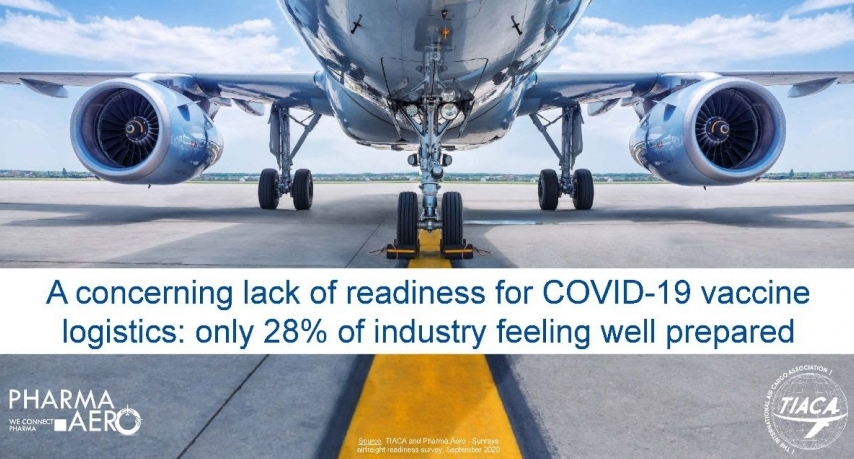TIACA, Pharma.Aero call for dialogue to move needle on industry readiness for vaccine logistics
TIACA and Pharma.Aero have called for increased industry collaboration, improving visibility and have urged governments to expedite the movement of Covid-19 related goods.

October 14, 2020: With only 28 percent of the industry feeling well prepared for the upcoming Covid-19 vaccines transportation, TIACA and Pharma.Aero have expressed their concern over the current state of air cargo readiness. They have called for increased industry collaboration, improving visibility and have urged governments, customs authorities, and border agencies to expedite the movement of Covid-19 related goods.
According to the results of Project Sunrays airfreight readiness survey, completed by 181 airlines, freight forwarders, ground handlers, airport operators and solution providers, majority of the industry players have begun preparation to handle, store, transport and deliver the future Covid-19 vaccines. They are setting up dedicated teams, engaging with partners, mapping and upgrading their capabilities, as well as developing new services. As compared to companies which are already in close engagement with vaccines manufacturers, companies not involved in direct conversations with the manufacturers felt the least prepared for the upcoming logistics challenge of vaccines transportation.
"We as an industry are as strong as our weakest link. To move the needle on industry readiness, we need to ensure everyone is engaged and informed. Only with a strong and transparent dialogue between pharmaceutical and air cargo sectors, governments, non-governmental organizations and healthcare institutions can we overcome these challenges. The sooner, the better," said Emir Pineda, member of TIACA's Board of Director and co-lead of the Sunrays project, initiated by TIACA and Pharma.Aero this August.
Areas of priority
Focus on industry collaboration between pharma and air cargo sectors; improving visibility and transparency; building adequate capabilities; getting the support from regulators to speed up the process and remove cumbersome procedures, and the help from international organizations and donors to ensure no country is left behind will ensure maximum air cargo preparedness to meet shippers' needs and expectations for speed, security, reliability and transparency and ultimately save lives.
Strengthening industry collaboration
Vaccines manufacturers should involve all their air cargo logistics providers as early as possible. All air cargo stakeholders shall be involved in the conversation, including airports and ground handlers. Air cargo capabilities need to be ramped up. Each air cargo stakeholder should map its existing capabilities at each location and make this information available. Dry ice, active containers, trained staff, and cold chain space availability should be secured early. Infrastructure investment decisions should be made as early as possible
Improving visibility
The use of tracking and monitoring devices should be encouraged and the approval process for their safe use in flight needs to start as soon as possible. Rollout of digital solutions and data sharing platforms should be accelerated.
Removing barriers
Governments, customs authorities, and border agencies should be ready to facilitate and expedite all Covid-19-related goods. International organizations, NGOs and donors should support cool chain capacity building efforts in least developed countries to ensure no one is left behind in the upcoming global immunization campaign.
"We are still at early stages of industry preparation for the transportation of Covid-19 vaccines and there are still a lot of unknowns. Delivering Covid-19 vaccines is a life-saving mission which will need a combination of people, infrastructure, standards, packaging solutions and collaboration. Getting the equation right requires us to work together now," said Nathan De Valck, chairman of Pharma.Aero's board of directors and member of the Sunrays project.


